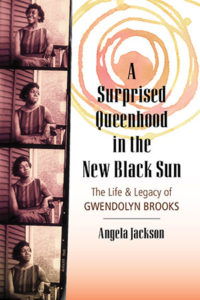Why Gwendolyn Brooks Will Live On Forever
She continues in each of us who is touched by her work
Poets and writers are immortal; they live as long as their words are spoken and speak to people. Because her poems and fiction are so captivating and faithful to the black experience, consequently the human experience, Gwendolyn Brooks will continue to be read and be alive.
Gwendolyn Brooks is immortal because she impacts and influences other poets and writers and others who influence poets and writers and others. Her genius and personality increase exponentially. Teachers taught students who in turn taught students about her work. Often anthologized, “We Real Cool” became one of the most well-known American poems. It is a part of the American heart, or should be, because it is so often taught.
I, myself, first met Miss Brooks when I was a young collegiate member of the OBAC Writers Workshop. She was “Miss Brooks” to me. There was a hush in my voice when I said it, for I knew she was a great poet and I felt awe in her presence, delight and wonder before her words. What there was to know about the mysteries of language I learned in the main from this master poet—with some Zora Neale Hurston, some ironic Mari Evans—some everybody black. But mostly I learned the deft turns of Gwendolyn Brooks and turned them around until they were mine. She would not have wanted me to copy her. Who likes a copycat? She herself said that I was an “experimenter” and like no one else. I treasure her assessment.
She herself was an experimenter and like no one else. She passed to us her regard for technique and technical daring. She liked it when the Black Arts poets did new things. She admired Haki Madhubuti’s craft and constant growth as an artist. His work and his person received a special blessing because he was also serious as an activist and institution builder. She understood the importance of black institutions and felt it was her responsibility to support them.
In Chicago on 111th Street is the site of Gwendolyn Brooks College Preparatory Academy. It is a spacious campus with the buildings set back from the street. In Harvey, Illinois, is situated Gwendolyn Brooks Middle School. Other schools named after Brooks are in Aurora, Bolingbrook, Eola, and Oak Park. In the early 1970s, Western Illinois University opened a very active Gwendolyn Brooks Cultural Center, where she often read. In her lifetime, she received more than seventy honorary degrees from around the country. A small Chicago park was named after her. Her name, among several, is engraved on the Carter G. Woodson Regional Library in Chicago. Her name is also engraved on the Illinois State Library in Springfield. She has been honored with a postage stamp. A plaque has been placed in front of her Evans home.
But these honors are physical appreciations and no match for the spiritual continuance of her legacy in the lives of others. For this reason, poets celebrate her each year on her birthday, June 7. The annual celebration—known as Brooksday—was conceived by Northwestern University professor Reginald Gibbons in 2013. A day-long presentation of the poet laureate’s work takes place at the Chicago Cultural Center and the Logan Center at the University of Chicago. Each year, the event is filled with readers young and old and audience members young and old. Every year, attendance grows.
Gwendolyn’s continuity through generations gives some sense of her enormous impact on black poetry today that is not of the academy. Young people are finding their voices and visions through her voice and vision. She is still as relevant today to young rappers as she was to the Black Arts poets of the 1960s.
When asked in an online survey to choose poets who had influenced them, some poets chose Audre Lorde or young poets. Malcolm London, the Chicago rapper and activist, chose Gwendolyn Brooks. Her “Beverly Hills, Chicago” had changed his point of view, had changed his way of looking at the world as he lived in an impoverished black community and went to school in a wealthy white community. After reading Gwendolyn, he understood his own dilemma better. She has a way of helping people understand.
Another legendary poet, Mari Evans, exhorted the Black Arts Movement poets to “Speak the Truth to the People.” This was always true of Gwendolyn. She spoke the truth even when it went against the grain. And she taught by excellent example.
Two Gwendolyn Brooks scholars offered perspectives on her a year after her death, October 30, 2001. In the Chicago Tribune, Dr. B. J. Bolden said, “In the popular world, she is a hero of the community. People see her as an ordinary person who really was extraordinary. She claimed to be humble. She wanted to be with the people. But she was a monumental role figure. She heightened awareness of the need for community.”
Dr. D. H. Melhem said, “In the devastations of September 11, and their relentless aftermath, such questions of values loom larger than ever. . . . Her legacy is to extend the boundaries of the human heart.”
Gwendolyn Brooks, daughter, sister, wife, mother, friend, mentor to many, poet, black woman poet and writer continues in each of us who is touched by her work and by memories of her. That compassionate and gifted black woman who cast such a dazzling glow is truly immortal.
__________________________________

Adapted from A Surprised Queenhood in the New Black Sun: The Life & Legacy of Gwendolyn Brooks by Angela Jackson (Beacon Press, 2017). Reprinted with Permission from Beacon Press.




















